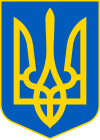| Law on the Succession of Ukraine | |
|---|---|
| Verkhovna Rada (Ukraine) | |
| |
| Citation | 1543-XII |
| Enacted by | Verkhovna Rada |
| Enacted | 12 September 1991 |
| Signed by | Chairman of the Verkhovna Rada |
| Effective | 5 October 1991 |
| Status: In force | |
 |
|---|
The Law on the Succession of Ukraine [a] is a key legal document (N 1543-XII) that played a particularly important role during the transitional period of Ukraine after the fall of the Soviet Union. The law was adopted by the Verkhovna Rada (Parliament of Ukraine) on 12 September 1991 and consisted of nine articles. The law became effective on 5 October 1991.